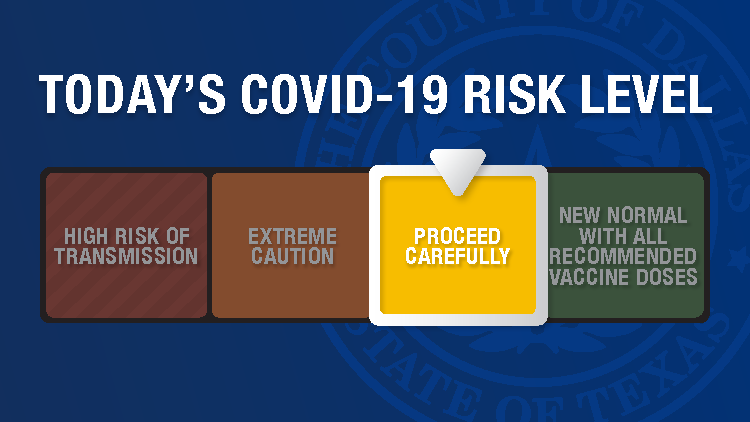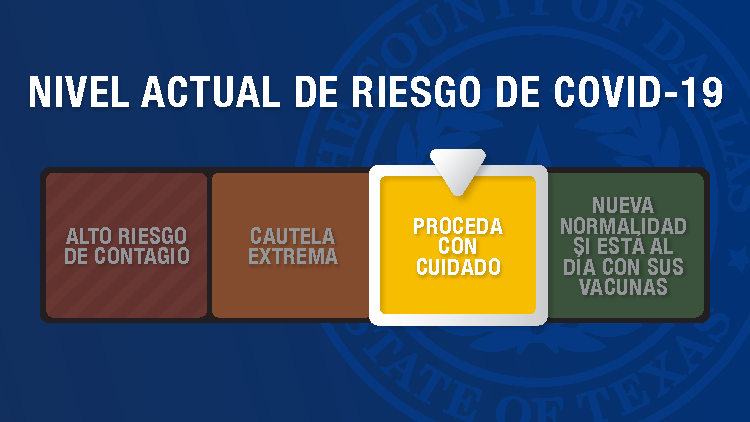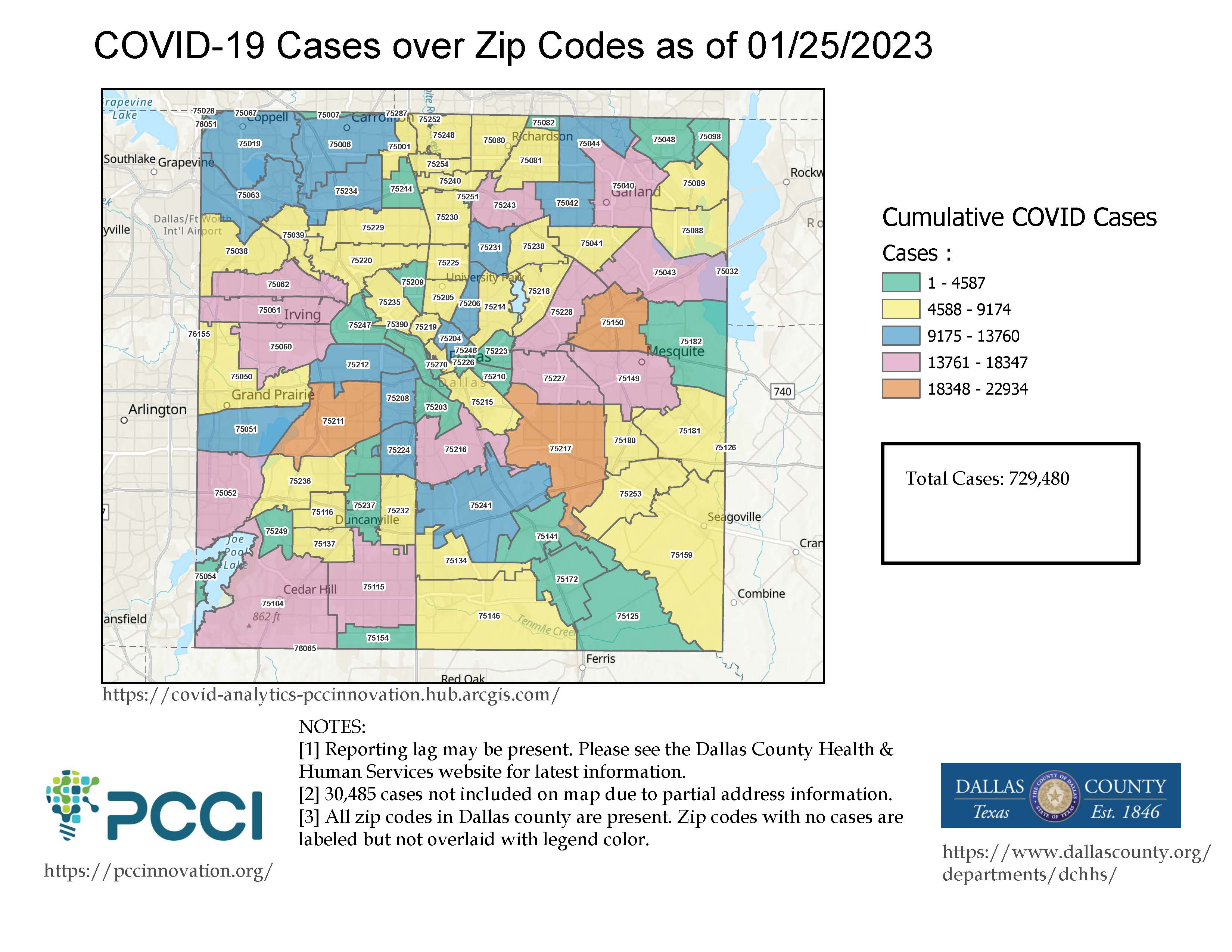Coronavirus (COVID-19)
Dallas County Coronavirus (COVID-19) Updates and Information
Today's Risk Level

Nivel Actual de Riesgo

Esta guía de los CDC describe qué actividades pueden reanudar de manera segura las personas completamente vacunadas. También indica que se recomiendan precauciones adicionales en áreas de propagación alta o sustancial, especialmente de la cepa Omicron altamente infecciosa, como ocurre en el norte de Texas.
COVID-19 Cases
*Staring March 8th 2024 DSHS has removed COVID-19 as a reportable condition, thus COVID-19 reporting of positive and negative cases are no longer required by practitioners and facilities to be reported to Public Health Agencies in Texas. DCHHS is encouraging local providers to voluntarily continue to report electronically if they have the capability. This change will impact the number of COVID-19 reports DCHHS receives and result in additional underreporting.
COVID-19 Monitoring Data

We are calling on Dallas County to help us stop of spread of COVID-19. You can be part of the #NorthTXDoesItRight campaign by following the safety guidelines created by our trusted group of doctors and city leaders. Do your part by following the Dallas County Health Guidance for the Public – outlined below – to keep yourself, your family and our community safe from COVID-19.
Check out our Facebook page to see our friends at the Dallas Stars, Dallas Mavs and the Dallas Zoo showing us how they stay safe by wearing their masks. Now it is your turn! Share a photo showing how you are following the DCHHS COVID-19 safety guidelines on Facebook, Twitter or Instagram using #NTXDoesItRight in your caption. By working together and reopening the right way, we can save lives and stop the spread of COVID-19.
Case Totals
Dallas County Health and Human Services (DCHHS) is continuing to update and upgrade the data collection system. Cumulative case counts are being updated and will be reported at a later time.
Numbers are updated daily.
Note: Does not include positive results from persons who reside out-of-state or outside of Dallas County.
Residents are asked to help prevent spread of the virus by practicing non-pharmaceutical interventions (NPIs) such as social distancing (avoiding close contact with other people, especially those who are sick), covering coughs and sneezes, and hand hygiene. Clean and disinfect frequently touched surfaces, and avoid touching your eyes, nose and mouth with unwashed hands. If you are sick, stay home.
Current travel advisories can be viewed at the U.S. Department of State and CDC. The CDC recommends that travelers defer all cruise travel worldwide.
Case Summary Information
With the exception of the Summary Table of Cases, the below are only periodically updated.
For weekday updates please visit the PCCI site here.
Dallas County Summary of Cases by City Distribution
Click here to view the most recent summary.
Dallas County Summary of Cases by Ethnic Distribution
Click here to view the most recent summary.
Dallas County HHS Summary Data
Click here to view the latest data.
(DCHHS updates this page weekly on Fridays)
Dallas County Confirmed COVID-19 Cases by Zip Code
Click here to view and download the Confirmed COVID-19 Cases by Zip Code map shown below.
Click here to view an interactive version of the Zip Code Map, updated daily.

Register to Get Your Personal Risk Score!
This is exclusive for Dallas County. MyPCI is free to register and use. It is a secure, cloud-based tool that doesn’t require personal health information and doesn’t track an individual’s mobile phone data. Instead, it is a sophisticated machine learning algorithm, geomapping and hot-spotting technology that uses daily updated data from the Department of Public Health on confirmed positive COVID-19 cases and the population density in a given neighborhood. Based on density and distances to those nearby who are infected, the MyPCI App generates a dynamic personal risk score.
We all know that proximity matters and it’s even more important now than ever while we work hard to get people vaccinated. We’re very excited to put this information in the hands of Dallas county citizens so they have contextual awareness of what’s happening around them and serve as a reminder of the things they can control: social distancing, face covering and hand hygiene.
Follow these steps to register and use - it's free!
- Visit https://mypci.pccinnovation.org/home
- Click "Register Now!"
- When prompted, use this Organization ID: DCHHS-62ta7b
- Complete and submit the additional registration information
- Log into your account to track your risk
Know Your Risk: Common Activities
Guidance for Individuals at High-Risk
High-Risk Individuals Are People That Meet Any One of the Following Criteria:
- 65 years of age or older
- Live in a nursing home or long-term care facility
- Have an underlying medical condition:
- Lung disease including moderate to severe asthma and COPD
- Serious heart conditions and hypertension<
- Immunocompromised (including cancer treatment, smoking, bone marrow or organ transplants, immune deficiencies, poorly controlled HIV or AIDS, and prolonged use of corticosteroids and other immune weakening medications)
- Are obese
- Have diabetes
- Have chronic kidney disease or are undergoing dialysis
- Have liver disease
Orientación para personas en alto riesgo
Personas De Alto Riesgo Son Personas Que Cumplen Cualquiera De Los Siguientes Criterios:
- 65 años o más
- Vive en un hogar de ancianos o en un centro de atención a largo plazo,
- Personas de todas las edades con una afección médica subyacente:
- enfermedad pulmonar que incluye asma moderada a severa y EPOC
- condiciones cardíacas graves e hipertensión
- inmunocomprometidos (incluido el tratamiento del cáncer, tabaquismo, trasplantes de médula ósea u órganos, deficiencias inmunes, VIH o SIDA mal controlados y uso prolongado de corticosteroides y otros medicamentos para el debilitamiento inmunitario)
- obesidad
- diabetes
- enfermedad renal crónica sometida a diálisis
- enfermedad del hígado
Latest Order from Judge Jenkins
Rescission of County Judge Clay Jenkins Covid-19 Health and Safety Order Regarding Long-Term Care Facilities Issued August 4, 2020
Effective as of 12:00 p.m. on March 8, 2022.
Supplemental Order on Continuing Requirements After Expiration of Stay Home, Stay Safe
Effective as of 11:59 p.m. on August 4, 2020.
Enmendado: Orden complementaria sobre los requisitos continuos después de la expiración de Stay Home, Stay Safe
Fecha de vigencia a las 11:59 p.m. el 4 de agosto de 2020.
Supplemental Order on Requirements for Food Processing Plants After Expiration of Stay Home, Stay Safe
Effective as of 11:59 p.m. on August 4, 2020.
Click here to view the full order.
Click here to view all COVID-19 related orders issued by Judge Jenkins
QUICK LINKS
LOCATIONS
EMPLOYEES
-
You must be on the network to see these links.


